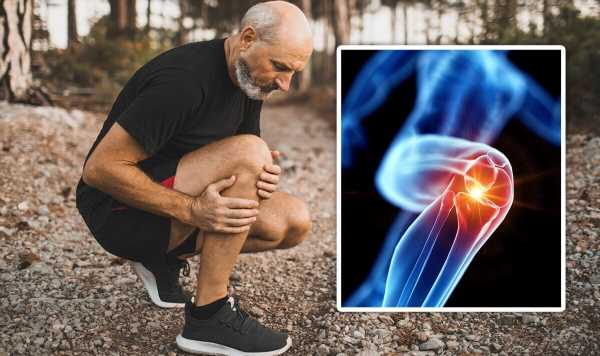Eamonn Holmes discusses Liam Gallagher's arthritis struggles
We use your sign-up to provide content in ways you’ve consented to and to improve our understanding of you. This may include adverts from us and 3rd parties based on our understanding. You can unsubscribe at any time. More info
One of the earliest indications of the joint disease, according to orthopeadic trauma surgeon Doctor Lisa Cannada, is painful or achy joints that gradually becomes worse. Described as a “classic” warning sign of arthritis, the discomfort could be triggered by activity. As the disease progressively gets worse, joints might swell and become tender to the touch. Doctor Cannada added that joints might begin to feel stiff throughout the day.
Firstly, joint stiffness can appear in the morning, then it can occur after prolonged sitting.
“It’s a feeling that you need lubrication to do something,” Cannada explained.
The affected joints may even begin to make a “grating sound”.
Doctor Cannada pointed out that grinding or grating when moving a joint is a sign that the cartilage has worn down.

While this symptom is most commonly experienced in the knee and hip, other joints can be affected too.
Hip arthritis, for example, can also lead to pain in the thigh or buttocks.
The NHS stated: “There’s no cure for arthritis, but there are many treatments that can help slow it down.”
Leading charity, Versus Arthritis, pointed out ways you can help yourself if you are beginning to experience arthritis.

“Increasing your physical activity and maintaining a good posture can help you cope more effectively with pain,” the charity noted.
While increasing the amount you walk, for instance, can be helpful, this will be aided by “more structured forms of physical activity”.
Examples include exercise groups, t’ai chi, qigong, and yoga.
“Whatever type of physical activity you prefer, check that your instructor is properly qualified,” Versus Arthritis noted.
Moreover, it would be helpful to see a physiotherapist who can give you tailored advice.
While experiencing pain when exercising can be off-putting, by resting too much, stiffness will increase.
Over time, the muscle will weaken and getting active once more will become harder.
Arthritis may lead to immobility if you do not address the condition.

In order to help ease painful symptoms, painkillers can be an effective tool.
If you are hoping to not rely on medication, using a heat pad on painful joints can be helpful.
Another technique is using an ice pack on affected joints to ease inflammation.
A good night’s sleep is also useful in helping to make the condition more manageable during the day.
Source: Read Full Article
